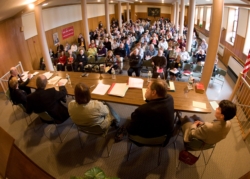‘Co-Workers’ conference focuses on role of laity
BRIGHTON -- Focusing on the role of laity in the local Church’s pastoral planning, more than 200 of the Archdiocese of Boston’s pastors, parish staffs and lay leaders attended a conference at St. John’s Seminary on April 4. More than 80 parishes, some by their entire staff, were represented.
The conference, entitled “Co-Workers in the Vineyard: Laity and Clergy Journeying Together in Christ,” examined both the United States Conference of Catholic Bishops’ 2005 document “Co-Workers in the Vineyard of the Lord” and the Boston Pastoral Planning Committee’s report released in the fall of last year. The documents were examined in light of the 200th anniversary of the archdiocese, the theme of which is “Journey Together in Christ.”
Aldona E. Lingertat, associate director of the Masters of Arts in Ministry Program, said she and the other organizers have worked to organize the event for over a year. The conference was designed to promote the bishops’ document and encourage lay people who serve the local Church.
The conference was meant to be a time for reflection, discussion and hope for the future, she added.
“At this time, when we’re planning for the future, we need to hold up the role of the lay ecclesial minister,” she said.
The event was sponsored by the MAM program, which provides formation for lay leaders, along with St. John’s Seminary, the Office of Clergy Support and Ongoing Formation, Office of Lay Ecclesial Ministry, Office of Permanent Diaconate Formation, Office of Regional Services, Office of Religious Education, Office of Worship and Spiritual Life and the Office for the New Evangelization of Youth and Young Adults.
While welcoming participants to the conference, Lingertat said she was “delighted to see such interest” in the event. Registration closed on Monday, and there was a waiting list, she said.
Father William Kelly, director of the Clergy Support Office, led the opening group in the Bicentennial Prayer. Throughout the day Father Kelly led the group in prayer and song.
In the keynote, Aurelie Hagstrom, a theology professor at Providence College in Rhode Island, addressed the “Co-Workers” document and what she termed the “explosion” of lay ministries since the Second Vatican Council.
The Church has entered the “age of the laity” where lay people collaborate in the internal workings of the Catholic Church, she said.
“Co-Workers” is a “landmark document” that pushed the conversation about lay ministers forward, but it was not meant to be a final answer. Rather, the document should be understood as a call for the renewal of ministry where lay ministry is understood and integrated into the life of the Church, she said.
The second conference speaker, Father George Evans, pastor of St. Julia Parish in Weston, served on the archdiocesan Pastoral Planning Committee, formed in January 2006. In its report to Cardinal Seán P. O’Malley, the committee said that Boston must assess its resources and maximize them through comprehensive planning in order to stay faithful to the Church’s mission locally. The committee determined that the archdiocese has a seven-year window in which to act.
Between 1994 and 2003, the archdiocese closed 42 parishes, mostly through merging parish communities. Since 2004, the archdiocese has closed more than 60 parishes through reconfiguration. If no diocesan-wide planning occurs, Boston faces “a continuing series of parish closings,” the document predicted.
At the conference, Father Evans said the archdiocese must foster a “culture of planning” that anticipates needs. For the sake of the good of all parishes, parishes located near each other need to work together and maximize the effectiveness of their programs, he said.
“Pastoral planning has to be constructive,” he said. “It has to build up the Church, and I say that even as unmistakably pastoral planning is also something that demands change, sacrifice and flexibility.”
The model that is most attractive to many in the archdiocese would preserve individual parishes but require that pastors and parish staff serve multiple churches. That model could be a “priest crusher” that would push the limits of priests and their staff, he said.
Whatever model is chosen, the declining number of priests will necessitate the service of lay ecclesial ministers well into the future, he added.
After the morning addresses, those at the conference had lunch followed by adoration where Father Richard Erikson, vicar general and moderator of the curia, preached. Like the Eucharist, members of the Church are the body of Christ, he said.
He said to participants, “Thank you for being the visible sign of Jesus Christ here and now.”
The afternoon consisted of a panel discussion, comments from Cardinal O’Malley and a question and answer session.
At the panel discussion, Father Paul Ritt, pastor of St. John the Evangelist Parish in Chelmsford, said Boston must foster a “culture of vocations” in the priesthood, religious life, marriage and lay ministries.
Lay ministers need a “well-rounded formation,” job security and a wage that allows them to live “reasonably comfortable lives,” he added.
Cardinal O’Malley addressed the group and asserted that the challenges that lie ahead in Boston are opportunities. In order for pastoral planning to be successful, Boston Catholics must approach the future with a sense of calling and a “theology of communion,” he said.
Catherine Schiavo-White, a volunteer at St. Mark Parish in Dorchester and student in the MAM program, said she feels called to be a pastoral associate. The conference gave her hope because it was an opportunity to gather with others who want to work to build up the Church, she said.
“I feel strength from it,” she added. “I knew before I came here that I was on the right path, but this just affirms it.”



















